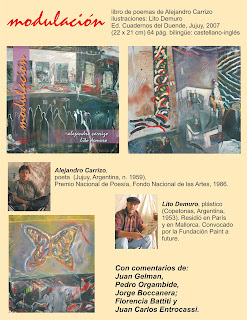Southerly
Volume 70 – Number 1 – 2010
The Journal of the English Association, Sydney, Australia
Golden Tongues:
The Arts of Trnslation
We first met Alejandro Carrizo in 2005 in his home town of Jujuy, northern Argentina, a strange city in the Andean foothills, almost undistinguished from Bolivia, a few hours up the mountains. But here, so far from the metropole, we found a poet who could just as easily have stepped out of 1950s New York, 1860s Paris or any other centre of Modernist artists. There is nothing magical about Carrizo´s realism –it is urban and European. But there is something deeply Jujenian about it, too– the names, the boredom, the dust.
We first translated these poems and others
for a bilingual edition funded by the Jujuy Ministry of Culture, illustrated with paintings by Lito Demuro. We had very little time, and so tended towards being literal. (The results were passable, but nothing more.) But Carrizo is a deeply complex poet, prone to passing over words´ meanings in favour of their sounds, and citing (what are to an outsider) obscure Jujuy localisms. Needless to say, we could never really capture the sonic element of Spanish, a language so well-suited to poetry it makes English look like an awkward adolescent, and to translate the local often comes across as either condescending or simply ridiculous. But that is what is great in Carrizo´s poems – and in the end we had to resign ourselves to the fact that something would be lost in the translation.
for a bilingual edition funded by the Jujuy Ministry of Culture, illustrated with paintings by Lito Demuro. We had very little time, and so tended towards being literal. (The results were passable, but nothing more.) But Carrizo is a deeply complex poet, prone to passing over words´ meanings in favour of their sounds, and citing (what are to an outsider) obscure Jujuy localisms. Needless to say, we could never really capture the sonic element of Spanish, a language so well-suited to poetry it makes English look like an awkward adolescent, and to translate the local often comes across as either condescending or simply ridiculous. But that is what is great in Carrizo´s poems – and in the end we had to resign ourselves to the fact that something would be lost in the translation.
Translated by Eugenia Demuro and Timothy Cahill

No hay comentarios:
Publicar un comentario